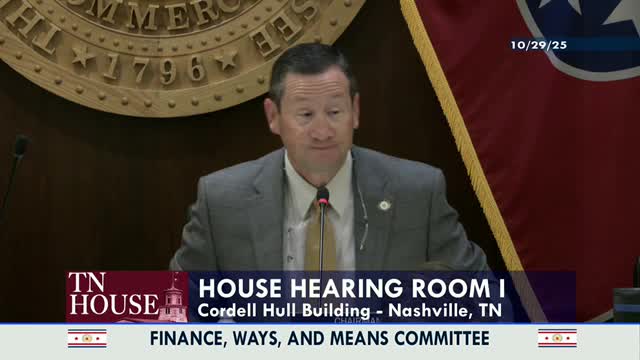TDEC highlights permit streamlining, park expansion and ARPA water projects in budget briefing
Get AI-powered insights, summaries, and transcripts
Subscribe
Summary
Tennessee Department of Environment and Conservation Commissioner David Salyers told the Finance, Ways and Means Committee that the agency has focused on permitting efficiency, state park expansion and managing ARPA-funded water infrastructure projects while reducing vacancies and modernizing IT systems.
David Salyers, commissioner of the Tennessee Department of Environment and Conservation, told the Finance, Ways and Means Committee on Oct. 29 that TDEC has prioritized permitting efficiency, state-park investment and implementation of ARPA-funded water and wastewater projects.
“Together, I think we've set a culture, we have established aggressive expectations and as a result I think we've stacked a number of wins for Tennessee,” Salyers said in his opening remarks. He described efforts to modernize IT systems, deploy GIS and “use AI” as part of a broader push to make permitting and regulatory programs more efficient.
Why it matters: TDEC manages core services—permitting, water resources, parks, brownfield cleanup—whose performance affects public health, economic development and local budgets. The committee hearing gave lawmakers current figures on staffing, permit volumes and the state’s handling of federal ARPA project timelines.
Key facts and follow-ups
- Staffing and vacancies: Salyers reported TDEC has 2,784 authorized positions with 216 vacant (about 7.8 percent); 47 positions have been vacant more than a year. He said long-term vacancies should be filled by the end of the calendar year. (Speaker: David Salyers.)
- Permits and productivity: Permit volumes rose roughly 20 percent in the prior two years while performance on statutory timelines remained above 99 percent. TDEC said it has moved more activities to general permits and activity exemptions to simplify work for applicants.
- ARPA water infrastructure: Deputy Commissioner Karen Simo told the committee the state’s water infrastructure investment program has funded 392 grants and more than 1,400 projects across local communities. Of roughly 825 construction projects, more than 35 percent (286 projects) are complete or nearly complete; about 85 percent of construction projects have met the start criteria (required documents submitted and site-inspection requests). Simo said only two projects have requested extensions so far and the state is “facing minimal risk” of returning federal funds. (Speaker: Karen Simo.)
- $10 million escalation fund: Lawmakers’ $10 million of state escalation funding for water regionalization projects remained available; one project offered funds but later declined them after local systems revised their plans, Simo said.
- State parks: Deputy Commissioner Greer Tidwell said the administration has dedicated funding to convert 12 park projects; six of the new parks have been opened, bringing the number of state parks from 56 to 62. Tidwell said the administration’s intent is to fund up to 70 parks, emphasizing economic development benefits for rural communities. He also described recovery at hurricane-damaged parks: Roan Mountain is largely open with some campground and bridge repairs pending; David Crockett Birthplace suffered major damage and will require additional insurance and recovery funding (TDEC estimates roughly $18.5 million gap from insurance for initial rebuild plus another ~$40 million for a full rebirth). (Speaker: Greer Tidwell.)
- Brownfields and TNClean: Salyers described the impact of the state’s brownfield and remediation funding (Tennessee clean/TNClean and related grants), citing local cleanup projects and a “bridal” program (BridAL/Brownfield Redevelopment Area Grants) that has helped communities reuse legacy industrial sites.
Committee questions and context
Lawmakers focused questions on the ARPA water projects, timelines and risk-management. Simo said the federal deadline structure means procurements must be submitted by Dec. 15 and most construction must be completed by the following summer; the state set grant termination dates and expects final federal reimbursement windows around year-end 2026. She described a layered outreach and monitoring system (six TDEC staff plus contractor support) to identify red flags and work individually with grantees.
Lawmakers also pressed on park recovery timelines after Hurricane Helene. Tidwell said Roan Mountain is “wide open” and two of three campgrounds are available; the bridge repair above the site is a Tennessee Department of Transportation (TDOT) project expected to be completed by November 2028. David Crockett Birthplace will require a multi-year rebuild, public engagement and additional non‑insurance funding to realize the administration’s master plan.
Ending: The committee did not take a vote during the presentation. TDEC officials said they will provide follow-up details on specific ARPA grantees and on their staffing plan for remaining long‑term vacancies; lawmakers asked for local project-level updates where requested.
